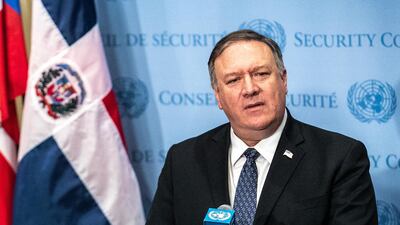Despite difficulties in securing high-level attendance from the European Union and the expected absence of Russia, US officials are in the final stages of preparing the Warsaw ministerial meeting on the Middle East in the Polish capital on February 13-14.
Working groups and follow-up meetings will come out of Warsaw, and US officials insist now that it is “not an anti-Iran meeting or coalition-building exercise.” As the name suggests, they said on a call with reporters, it’s a meeting “to promote a future of peace and security in the Middle East.”
A welcome dinner will be held at the Royal Palace on the 13th, followed by a day of discussions at the national stadium. A quad meeting between the US, UAE, UK and Saudi Arabia is expected to be held on the 14th to discuss Yemen.
_______________
Read more:
US and Poland promise broad agenda for Middle East summit
______________
The sessions will include “regional crises and international responses, missile development and proliferation, cyber and emerging threats, and terrorism and illicit finance. It will also include specific discussions on Syria and Yemen,” a US official said.
“Iran is not a specific agenda item … but it’s difficult to talk about the region’s challenges without referencing Iran,” he added. The change in tone from what was initially announced by US secretary of state Mike Pompeo as “an important part of our coalition-building effort” and “making sure that Iran is not a destabilising influence”, is in response to European pressure. Now, the US officials are emphasising that “this is not an anti-Iran meeting or [a] coalition-building exercise.”
Last September at the United Nations, US officials initially proposed a meeting on Iran’s threats but ended up broadening it to nuclear and missile threats at the request of the European partners.
In Warsaw, regional foreign ministers from UAE, Saudi, Kuwait, Egypt, Jordan, and Bahrain are expected to attend. The six countries are holding a consultation meeting at the Dead Sea in Amman next Thursday to prepare for the Warsaw summit. Israeli prime minister (and foreign minister) Benjamin Netanyahu is also flying to Warsaw for the meeting.
The goal of the conference is “to take the policy priorities that emerge from the ministerial meeting and to operationalise those policies by having follow-on meetings in various parts of the world,” the US official said.
“We would have host countries, and we would invite people, at the expert level … this would be at the assistant secretary of state level [level 3], we would invite everybody who attended the ministerial to then attend these meetings to keep working on things like on Syria and Yemen, cyber, missile proliferation.”
On Syria, the US has invited Turkey to the summit but there has been no confirmation thus far on Ankara’s attendance. Iran has slammed the gathering and its foreign minister Javad Zarif called previous participants at similar meetings “disgraced and marginalised.”
Former US officials and experts told The National that while the participation is important, tangible results from the meeting will decide its success.
Aaron Miller of the Woodrow Wilson Center, who served in Democratic and Republican administrations and helped setup similar conferences, did not expect groundbreaking results. “Even with the most focused, it’s hard to produce practical and tangible results.”
The former US negotiator told The National that “the Warsaw gathering is too big, too diffuse … With neither the Russians nor Iranians present, it’s hard to see much progress on pressing issues like Syria.”
But Mark Dubowitz from the Foundation of Defense for Democracies saw the meeting as an opportunity to showcase concerns over Iranian threat. “It will demonstrate that the concerns over Tehran’s destructive behaviour are widespread and global in nature and include dozens of countries.”
Mr Dubowitz rejected the idea that the agenda is diluted and no longer focused on Iran, stressing that its destabilising role is across the spectrum and issues on the agenda. He also saw in Warsaw an opening “to expand the Iran conversation beyond the P5+1 to the dozens of countries deeply concerned about the malign and destructive activities.”
“The P5+1 construct has led to paralysis … this is a way to move beyond it.”
Others, including Robert Satloff of The Washington Institute for Near East Policy, highlighted the participation in the event with both Arab and Israeli delegations attending. “The Warsaw summit has important participation but it will be judged by practical accomplishments.”
Few experts are predicting tangible results. Aaron Miller, borrowing a line from the TV sitcom Seinfeld, said the Warsaw conference “has all the makings of ‘a show about nothing’. And given the amount of effort and time to organize, it’s a fair question to ask why it’s taking place at all.”

